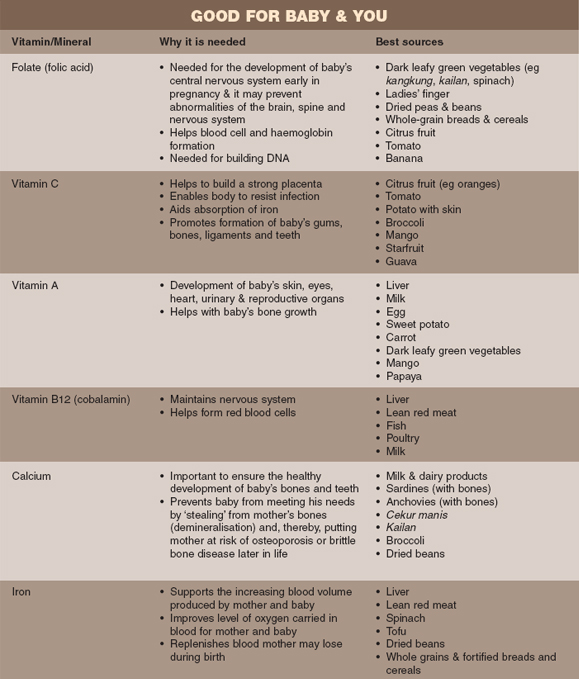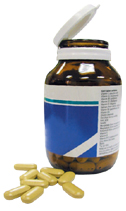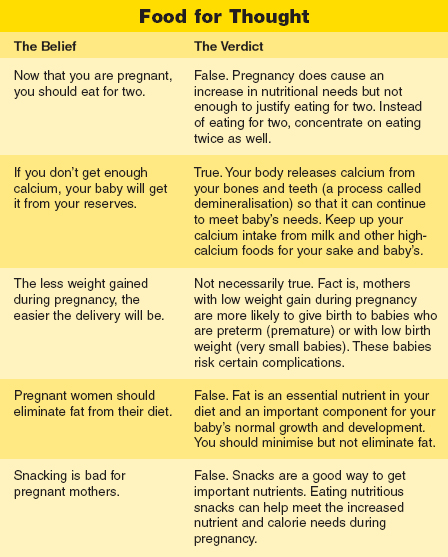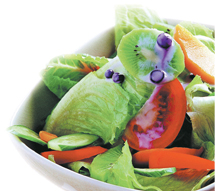While you’re pregnant, baby only has one source of nourishment… and that’s you. This doesn’t mean that you need to ‘eat for two’. It does mean, however, that you need to eat sufficiently and sensibly to help keep both of you healthy throughout the pregnancy.
Habit #1: Balance your diet
As shown in the Food Guide Pyramid, your diet should consist mostly of carbohydrate foods, more fruits and vegetables, moderate amounts of protein foods as well as milk and dairy products, and finally, minimal amounts of fats, oils, sugar and salt.
Habit #2: Go for variety
Different foods provide different combinations of nutrients (energy, carbohydrates, fibre, protein, fats, vitamins, minerals and healthful food components) in differing amounts. In order to gain the goodness that different foods can offer, eat a wide variety of foods.
Habit #3: Eat according to your needs
Baby’s growth and the changes to your body call for an increase in total daily energy requirements. So it’s normal that your appetite may increase a little. However, your body also seems to make more efficient use of the food eaten. This is why many women can achieve normal weight gain during pregnancy without eating significantly more than usual.
Habit #4: Eat regular meals
Stick to three main meals (ie breakfast, lunch and dinner) to keep you and baby going through the day and night. If your main meals are small or if you feel hungry in between, don’t hesitate to have a morning or afternoon snack of milk or yoghurt, digestive biscuits or bread, noodles or fruit.
Habit #5: Choose foods rich in vitamins & minerals
When pregnant, you need more of almost every vitamin and mineral than usual. Most of these increased requirements can be met through a carefully planned, nutritious diet. Nevertheless, you should consciously give preference to foods that are rich in calcium, iron, vitamin C, vitamin A, vitamin B12 and folate (folic acid). These micronutrients are found in foods listed in the table below as well as in processed foods, if indicated on their labels.

Habit #6: Don’t eat too much or too little
Overeating may cause you to gain too much weight in the course of your pregnancy. By the same token, now’s also not the time to go on a weight-loss diet. Both situations could do your baby a lot of harm.
Habit #7: Balance your energy intake with physical activity
Getting pregnant is one of the best reasons for leading a more active lifestyle. Whether it’s taking a walk, going for a swim, gentle stretching or whatever gentle physical activities you enjoy, just do them for at least 30 minutes (in one session or three 10-minute sessions) every day. The routine will help you burn off excessive energy from food and improve your digestion, while getting you in good shape to handle the rigours of birth and advancing pregnancies.
Are You At Nutritional Risk?
Extremely poor eating habits before or during pregnancy can harm both you and your baby. If you are under-nourished, you may lack energy or certain nutrients that might lead to complications including poor cell development in your unborn baby, low birth weight. Over-nutrition is just as undesirable. Excessive energy (from overeating or habitually taking high-fat foods) causes you to become overweight or obese. These conditions can lead to a higher risk of diabetes or hypertension in pregnancy, larger-than-normal babies, and other problems.
Over-nutrition may also occur as a result of taking certain vitamin (eg vitamin A) or mineral (eg iron) supplements without a doctor’s prescription. Such situations can lead to defects in baby’s bones, heart, nervous system, head and face.

Get specific dietary advice from your doctor or dietitian if you have any of these nutrition risk factors:
- Were significantly underweight or overweight at the time of conception
- Do not ordinarily consume a wide variety of nutritious foods
- Take vitamin or mineral supplements without a doctor’s prescription
- Have a history of chronic dieting, skipping meals or fasting
- Use cigarettes, alcohol or recreational drugs; these are not only poisonous, they can also adversely affect your appetite and food intake
- Are carrying more than one baby
Eating Tips
- Avoid eating raw or undercooked meats, fish, eggs and soft cheeses to reduce the risk of bacterial infection for you and baby.
- Artificial sweeteners are not recommended for use during pregnancy.
- Limit intake of beverages containing caffeine (eg coffee, tea or cola).
- If you experience nausea (morning sickness), try to eat 5 to 6 small meals per day. Eat slowly and relax after meals.
- Asam boi, Kajang satay (must be from Kajang 40 km away, nowhere else!), cendol with lots of syrup, or mamak fish curry that you tasted during your honeymoon in Penang … these and all sorts of other cravings seem to come from nowhere when you’re pregnant. If you really must, go ahead and indulge your cravings. Just remember not to eat anything that might be harmful to you and your baby.








Comments